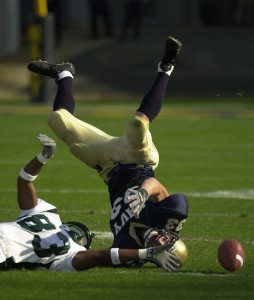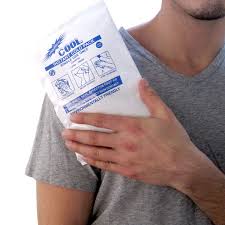Shoulder pain has a way of creeping into nearly every part of daily life. Simple movements — like reaching into a cabinet, fastening a seatbelt, getting dressed, or even finding a comfortable sleeping position — can suddenly become frustrating or downright painful....
Sleep plays a vital role in healing, recovery, and overall well-being. Unfortunately, hip pain can make getting a full night’s rest feel nearly impossible. Tossing and turning to find a comfortable position, waking up from sharp or aching pain, or starting the morning...
If you are struggling with lower back pain that radiates down your leg, you might have hit the internet searching for answers, only to find the terms “sciatica” and “herniated disc” discussed frequently. This is because both conditions can cause debilitating back...
Common Shoulder Injuries in Football

Football leads all other sports in the number of injuries that occur during play. The rough nature of the sport and high-speed contact make injuries common. Whether athletes are tackled or run into each other, their bodies absorb the impact, which can cause serious injury.
Shoulder injuries are particularly common in football, occurring from contact with other players or the ground or from throwing injuries.
Types of Shoulder Injuries
The most common types of shoulder injuries include shoulder dislocations and separations. These can occur from direct contact with another player or the playing surface.
Shoulder dislocations occur when the humerus ball disassociates from the scapular socket. The shoulder is one of the most frequently dislocated joints in the body. A shoulder separation, on the other hand, occurs when the ligaments attached to the collarbone partially or completely tear away from the shoulder blade.
Symptoms of a dislocation or separation include severe pain, grinding, limited movement and a visible deformity.
Rotator cuff tears often occur from overuse and repetitive motion, such as throwing a football, or trauma from man-to-man contact or a fall.
There are two different types of rotator cuff tears. In a partial tear, the tendon is not completely detached from the bone, whereas a complete, full-thickness tear occurs when the tendon is torn away from the bony attachment. A complete tear can’t heal on its own and must be repaired with surgery to regain full range of motion and function.
Symptoms of a rotator cuff tear include pain when lifting your arm from your side, weakness in your shoulder, a snapping feeling when trying to move your arm, or pain that worsens at night. Over time, symptoms of serious rotator cuff tears become worse and more painful and can’t be relieved by rest or medicine.
Treatment
If you’re experiencing consistent shoulder pain that rest, ice, or anti-inflammatory medication doesn’t relieve, you should see a doctor. Discuss your symptoms and let the doctor know how the injury happened. A physical examination will be performed, and you’ll likely undergo tests that may include X-ray, ultrasound, or MRI.
For mild shoulder soreness or injuries, rest and icing generally are effective in treating the injury and reducing pain. Anti-inflammatory drugs such as aspirin, ibuprofen, or naproxen can also help reduce pain. If swelling, redness, warmth, or pain persists after several days, you should see a doctor to be evaluated.
For serious shoulder injuries such as rotator cuff tears, surgery could be necessary depending on the severity of the injury. If you frequently experience shoulder dislocations, doctors may also suggest surgery.
Prevention
When playing football, the first step for preventing shoulder injuries is wearing regulation equipment and padding that fits properly, especially shoulder pads. Be sure to get fitted for protective equipment at the start of every season.
Another preventive measure is practicing proper tackling and blocking techniques. You should also participate in a strength and conditioning program to help strengthen your body and make it more flexible and less prone to injury.
It’s important not to ignore a shoulder injury because it could become more serious and painful. Contact your doctor if you’ve been experiencing painful symptoms for more than a couple of days. To prevent further shoulder injuries during football, be sure to wear proper-fitting equipment and utilize correct techniques on the field.
For more information about shoulder injuries, download our eBook The Pre-Operative Guide to Shoulder Surgery or set up a consultation with one of Premier’s physicians.



